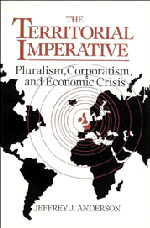Book contents
- Frontmatter
- Contents
- List of figures
- List of tables
- Preface
- 1 Introduction
- 2 Power-dependence and regional economic crisis
- 3 Central governments and regional policy
- 4 The British regions
- 5 The German Länder
- 6 The territorial imperative: Political logic interprets problem logic
- List of abbreviations
- Bibliography
- Index
5 - The German Länder
Published online by Cambridge University Press: 26 March 2010
- Frontmatter
- Contents
- List of figures
- List of tables
- Preface
- 1 Introduction
- 2 Power-dependence and regional economic crisis
- 3 Central governments and regional policy
- 4 The British regions
- 5 The German Länder
- 6 The territorial imperative: Political logic interprets problem logic
- List of abbreviations
- Bibliography
- Index
Summary
The German cases share broad similarities. Regional responses to decline in the Saarland and North Rhine–Westphalia were rarely region wide in scope, were inherently politicized, and remained well-insulated from the effects of federal policy initiatives. As such, they depart in key respects from the patterns of interaction uncovered in Britain. While theoretically significant differences between the German Lander emerge, the common elements are more striking, and can be traced to the presence of regional governmental institutions, engaged political parties, and a highly institutionalized, multilateral policy-making framework, each of which is wholly absent in the British regions. These factors create distinctive resource distributions among subnational actors and greater latitude for responses bearing the imprint of a partisan logic.
The Saarland, 1960–86
The Saarland is the smallest and youngest of the original German Lander, having joined the Federal Republic officially in 1959. The origins of the state's economic travails are a matter of scholarly and political controversy. The debate pits those who emphasize political factors – unstable boundaries, unfair treatment at the hands of the French, and late incorporation into the Federal Republic''s economy – against those who point to the constraining role of economic and structural factors like poor quality coking coal, outmoded production methods, and the late take-up of new technology. In any event, the Land's decline can be traced back to the turn of the century, by which time the coal and iron-working industries in the region had lost production and market battles with competitors in the Rhine-Ruhr area, as well as those in nearby Lorraine and Luxembourg. The Saarland is a typical mining region whose economy has always been based on coal and steel.
- Type
- Chapter
- Information
- The Territorial ImperativePluralism, Corporatism and Economic Crisis, pp. 144 - 186Publisher: Cambridge University PressPrint publication year: 1992



